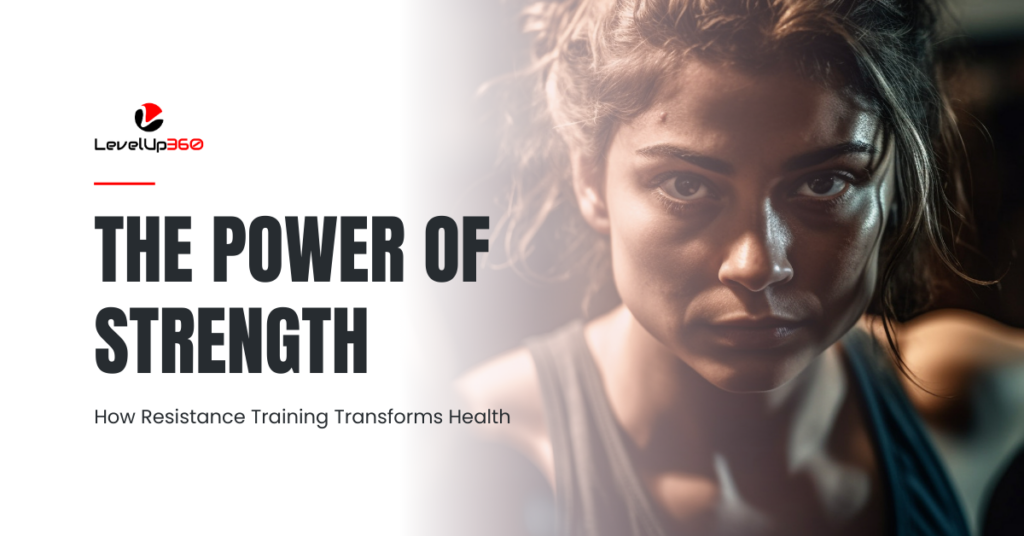
The Power of Strength: How Resistance Training Transforms Health
Do you still believe cardio is the holy grail for fat loss, fitness and disease protection? Have you wondered whether strength training deserves equal footing beside endless treadmills and spin bikes for improving health? What if resistance exercise defends your body better than previously thought against decay and disease as you age?
For decades, steady-state aerobic training has dominated exercise recommendations for weight loss, fitness and overall wellness. Messages to walk briskly or jog moderately for 30 minutes per day proliferated based on cardiovascular disease research. Gym floors filled with endless treadmills, bikes and ellipticals to get your target heart rate up. With lifestyle diseases still ballooning though, it’s time we re-evaluate conventional wisdom. Could our nearly exclusive cardio focus enable illness by inadvertently neglecting another fitness modality? One now proving enormously valuable based on an accumulating body of recent evidence – resistance training.
The Resistance Training's unparalleled improvements helps to body composition, metabolism, injury resilience, functional longevity, chronic disease risk reduction and even mental health
Unparalleled Improvements
Despite cultural myths that lifting serves purely vanity, properly programmed strength training offers unparalleled improvements to body composition, metabolism, injury resilience, functional longevity, chronic disease risk reduction and even mental health. Beyond enhancing the quality of life through improved mobility and independence into old age, clinical research now clearly links resistance training for health optimisation to lifespan itself. Put simply – building muscle and strength protects your body for far longer than previously realised if performed sensibly over time.
The expansive impacts of resistance exercise have been elucidated only recently as scientists shift focus beyond traditional aerobic training. This includes profound protective effects against heart disease, diabetes, dementia, osteoporosis, sarcopenia, anxiety, frailty and shortened health span. Leaders currently position resistance training equally alongside cardiovascular exercise for adults and even develop separate guidelines specifically for muscle strengthening. However, with data on muscular health historically scarce up to this point, resistance training had not received adequate attention for disease prevention until the last few years. And the trend continues that the more research is done, the stronger the recommendations become to prioritise strength training. So beyond the treadmill, let’s explore the latest revelations on lifting weights as a critical pillar of longevity…
Latest Revelations on Lifting Weights as a Critical Pillar of Longevity

Muscle Drives Metabolism and Enhances Fat Loss
Skeletal muscle is an extremely metabolically active tissue. More muscle mass equals a higher metabolic rate which passively burns more calories around the clock. Additionally, resistance training potently builds muscle in a way that simultaneously supports fat loss through a synergistic “recomposition” effect when nutrition supports metabolic needs. Shedding excess body fat dramatically lowers risks for chronic disease in and of itself. So increasing calorie-burning lean mass by lifting paves the way for sustainable weight control rather than relying solely on cardio which often leads to diminishing returns over time as the body adapts.
Muscle Loss Feeds Disease Progression
Do You Know Muscle Loss Begins By Age 35?
Loss of muscle mass and function leads to more rapid progression of disease, physical frailty and death. It’s disturbing to realize muscle loss begins as early as 35 and accelerates substantially by 50 if not properly delayed by resistance exercise. Caring for your muscle health during younger years has lasting protective effects against sarcopenia, falls and fractures, cardiovascular events and more.
Think about this – If you are 45 now for example, how much precious muscle have you already forfeited compared to your vibrant 30-year-old self? What are the long-term implications for your health if this insidious muscle loss remains unchecked?
Muscles Produce Anti-Inflammatory Hormones
Beyond passively burning more calories at rest, muscle tissue produces and releases various proteins called “myokines” that offer widespread effects against inflammation, insulin resistance, cardiovascular disease and even potential malignancy prevention. By proactively adding muscle mass via resistance training, you increase the production of these potent protective myokines.
Resistance Training Stimulates Bone Strengthening
Lifting heavy weights (or your body weight) signals increased bone mineral density when paired with adequate protein intake. Stronger bones prevent fractures, enable ongoing mobility past middle age and avoid osteoporosis. The mechanical loading from resistance exercise allows bone modelling and remodelling to adapt to increasing demands from muscle contractions pulling on attachment sites.
Increased Muscular Capacity = Lasting Vitality
Building strength and muscle endurance leads to substantial increases in your body’s reserves to handle physical, mental and emotional stresses without becoming overwhelmed or exhausted. With this protective buffer backing you up, your resilience against declines in daily functioning, mobility, independence and vigour lasts decades longer. Functional strength reflects robust health – inside and out.
Strength Training Twists Back Your Biological Clock
As reproductive and growth-related hormones like testosterone, estrogen, DHEA and human growth hormone diminish with age, muscle loss accelerates while vigour declines. Well-designed resistance training however has a unique ability to elevate these youthful anabolic hormones back toward peak levels – putting up roadblocks to your biological clock winding down prematurely.
Resistance Training Shields The Brain

Beyond physical changes, proper resistance training protects the brain against cognitive ageing and neurodegenerative disease. The variety, complexity and intensity involved in lifting weights support better memory, processing speed, focus, learning capacity and executive function compared to cardiovascular training alone based on recent controlled trials. Muscle strength serves mental power.
It Boosts Mental Health
Aside from preserving physical abilities into old age and keeping diseases at bay, lifting combats anxiety, depression, perceived stress and mood issues particularly well versus other lifestyle approaches. The meditative practice of progressing through a structured strength workout alongside boosted confidence from seeing your body transform over time provides an immense psychological benefit.
It Puts Less Stress on The Body
As youthful levels of cardiovascular endurance fade due to accumulating joint, tendon and ligament wear and tear, resistance training fills the gap. It loads tissues differently by emphasizing the quality of movement instead of quantity, duration or impact. You can continue lifting even with limited mobility because resistance loads are placed through joints using muscle contractions in safer ranges of motion.
Start Early But It’s Never Too Late
While the earlier you begin resistance training for health the greater the lifetime dividend from amplifying effects, it’s encouraging to know starting strength training at any age can still provide enormous benefits. Although regaining lost muscle mass takes more dedicated effort later in life, sticking to a properly designed program will bestow substantial gains. Consistency ultimately matters more than when you start optimizing muscle strength.
The Takeaway
Put simply, strength training promotes disease prevention while helping us function, live and feel better longer at ANY age. But the earlier the start and more consistent the stimulus, the greater protective effects accumulate.
Strength training transcends aesthetics or performance goals. At its core, it represents caring for your lifelong health at the most foundational level – your muscles and bones. It all starts there. Strength allows everything else good to follow. So don’t just go through the motions anymore. Move with purpose and progressively challenge your muscles. Your body and mind will thank you for decades to come.
Recommended reading
Recommended reading
Additional Resources
Feeling in control of your health
If you are interested in improving your health and wellness, check out other resources such as Our Blog, Free Resources and/or join our private Body-Mind Transformation Secrets Community on Facebook, and go on an even deeper dive with me to uncover how to succeed in your health and wellness goals.
You may also be interested in our Sleep Secrets Cheat Sheet. It is a great resource with strategies to fix and optimize your sleep which is crucial to succeeding in your health and wellness goals.
Resources
Pictures
Freepik.com and Vecstock from Freepik.com








